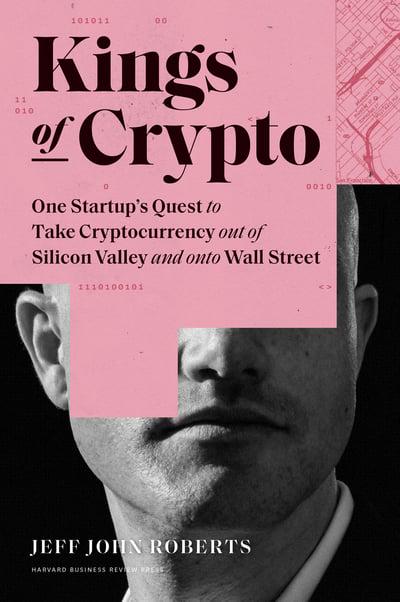
- Jeff John Roberts: Kings of Crypto: One Startup’s Quest to Take Cryptocurrency out of Silicon Valley and onto Wall Street (Harvard Business Review Press, 2020 — US, UK)
This is the Hero’s Journey of Brian Armstrong, founder of Coinbase. The genre is mass-market corporate history. The book’s really about bitcoin.
A Great Man for our times
 I can barely tell you how much I loathe the writing style of popular company histories or CEO biographies. “Boss erotica,” as Ed Zitron calls it.
I can barely tell you how much I loathe the writing style of popular company histories or CEO biographies. “Boss erotica,” as Ed Zitron calls it.
The job is to describe tedious nonsense as if it’s of vital interest. Writing about the most inane guff as if it’s of significance and import. Authorised, unauthorised, they all do this.
Kings Of Crypto, Jeff John Roberts’ history of Coinbase, starts with a stock scene from the genre: the interchangeable CEO’s tough day dealing with some early triviality as if it’s of significance and import, and as if anyone, including the interchangeable CEO, will remember it a year later.
I don’t mean to get stuck into Roberts here. He’s trapped by genre. They all do it. Every book on Facebook, which I skimmed far too many of for my Libra book. Even Nick Bilton’s Hatching Twitter, and that got relatively snarky.
It’s a style, it’s mandated by editors, and it sucks. It offers no room to break the fourth wall and say “these are clearly blithering idiots as well as parasites upon humanity, and we need to bring back the guillotine.”
I remember Steve Jobs, the Journey Is the Reward by Jeffrey S. Young (1988). That book masqueraded as this style — but made it extremely clear what an asshole Jobs was.
I’m particularly sensitive to the style because I fear having to learn it — editors love it, and I’m currently nine months late on my proposal for the book on El Salvador and bitcoin. At least that one has a character or two. If you told Charles Dickens about Nayib Bukele, he’d tell you to tone him down a bit.
Editors don’t want historical material forces — they want something character driven. It’s about the people. The CEO is the Main Character.
The trouble is that the Great Man theory of history is wrong, dumb and bad. But it’s harder to make material circumstances into a gripping tale of derring-do.
The demand for character driven narratives fails when the characters are in fact just lucky idiots.
Our hero, INTERCHANGEABLE CEO with an OBSESSION
Brian Armstrong starts his heroic journey battling his first and deadliest foe: venture capitalists. “It was the summer of 2012, and Brian was brimming with certainty that he would build Y Combinator’s next famous startup.” I’m sure you’re riveted too.
Two and a half years later, as he walked through the doors of Y Combinator, Brian was more fixated on bitcoin than ever. By now, he had developed a special insight of his own about the currency, one that he would soon deliver to millions of people.
Brian’s creative genius leads him to realise there’s demand for a place to buy bitcoins easily! This is an idea that nobody has had before! (Never mind Mt. Gox.)
Brian’s secret ingredient? Centralisation. Just in case you thought “decentralised” meant something and wasn’t just a marketing buzzword promising legal immunity that doesn’t exist.
We meet co-founder Fred Ehrsam through the angst of a child of privilege who can’t get really into lacrosse or Wall Street. “In fact, he was dying inside.” Bitcoin was his rock’n’roll.
Coinbase hires its most enthusiastic customers, and is run only just a little like a cult — “Coinbase was very hierarchical, like the military. I idolized Fred as a leader.” The “workaholic culture.” “Running through brick walls.” “Brian glommed onto a cultish management fad called ‘Conscious Leadership’ that employees described as a hybrid of New Ageism and a twelve-step recovery program.”
You can’t really say “It wasn’t that the founders lacked humanity” straight after paragraphs of Ehrsam shouting abuse at his subordinates.
Here is the most interesting sentence in the book:
Tasked with organizing Coinbase’s first retreat, Nathalie deftly deflected Brian and Fred’s idea that they do a ‘hunt and gather’ outing that would require every employee to kill their own food.
Roberts doesn’t do what anyone else would have done, and ask what made them think that was ever a suitable idea. Armstrong and Ehrsam take the team to a shooting range instead.
I’m sure this is all perfectly normal in the startup world, and that explains a lot too.
The rest of the book is a history of bitcoin to 2020, through the lens of the Coinbase executive suite.
Armstrong is not interesting. He’s in business to make money, not present a fascinating personality. Roberts’ attempts to write Armstrong as interesting only make it clear how he just isn’t.
The real hero was the bitcoin along the way
Coinbase is important insofar as it’s the largest actual-dollar crypto exchange and the first choice for the general public to get its cryptos. But Armstrong, or even Coinbase, isn’t the point of the book. Bitcoin is.
Jeff John Roberts is a cryptocurrency journalist, previously at Decrypt, and now running Fortune’s crypto vertical. Roberts is very much an enthusiast — he’s been “fascinated with cryptocurrency and the role Coinbase has played in bringing it to the general public” since he bought his first bitcoin from them in 2013.
The book is really about Roberts’ fascination with bitcoin. Armstrong is interesting insofar as he presents bitcoin to the masses. Bitcoin is amazing.
This attitude speaks to the hearts of the tech libertarians who read Satoshi’s white paper and saw the future — and nobody else. The reader seems expected to see the list of weird anarcho-capitalist promises and want those things.
What does bitcoin do? It’s a “world-changing technology.” Bitcoin promises a new world of financial liberation and government-free money. But the book doesn’t show anything that would change the world — except for the worse.
The secret ingredient is crime. “The digital money kept turning up in a whole spate of criminal activity — from money laundering to drug sales to extortion.” Coinbase is shocked when “some of their customers treated the company as their personal money-laundering agent for a host of crimes.” Ehrsam pitches to investors that bitcoin is “immune to country-specific sanctions.”
Roberts treats the pervasive criminality as an aberration in the glorious rise of (the price of) bitcoin, and never mind that evading regulation was bitcoin’s original purpose — “Bitcoin’s outlaw origins kept poking through.”
Breaking laws is not an aberration in cryptocurrency. It’s the use case.
The only other use case shown is speculation and number go up. The book talks a lot about how big the number is. How and why the number goes up is not interrogated.
Bitcoin doesn’t work as a payment system either: “Even as more merchants accepted the currency, it became obvious to many that it was just a gimmick. Satoshi’s invention, it turned out, was a lousy way to pay for things.”
Bitcoin is a “bona fide rival to gold” — but only in the minds of those who are already true believers, and only because it failed so hard as peer-to-peer electronic cash.
Roberts’ explanation of how the blockchain works is okay. But he says Nick Szabo is Satoshi Nakamoto, then justifies this with the claim that:
Additionally, linguists have compared the white paper and Satoshi’s emails with writing samples from Szabo, Finney, and other possible candidates. Szabo is far and away the closest match.
This isn’t what happened — it was a bunch of final-year students promoted in a university press release, and their professor who couldn’t tell LATEX from OpenOffice. There’s a conspiracy blog that said that evidence against this claim was evidence for it. Dominic Frisby also asked a guy in his bitcoin book. That’s it.
The hero returns
If you need a history of Coinbase, this is that. I’m confident this book is as factually correct as Roberts could make it. I learnt a lot about Coinbase and Armstrong. I didn’t care about it.
I don’t think Roberts was trying to depict Armstrong as a boring asshole, or Ehrsam as a sociopath — but he did.
The book talks about the brilliance of bitcoin — but at no point makes its argument for this claim, and instead presents a string of bitcoin’s failures. The only use cases shown are belief in bitcoin itself as an object of desire, and crime.
I’m not sure how I’d write this book in less suffocating genre constraints. But there’s probably a story to tell about conspiracy theory thinking in good times for the business economy and how there are no new frauds. And there’s definitely a story to tell about Coinbase’s long-time position as the cashier’s desk for the unregulated offshore casinos — which Roberts somehow never quite gets to. This would also minimise the word count directly about Armstrong.






